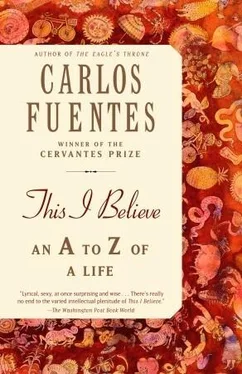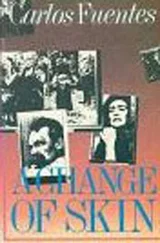The person who works by night inevitably ends up feeling like the creator of the world. If he doesn’t work through the night, the sun will not come out the following day. As I would be getting ready for bed, Carlos would come in to say good night, wrapped in an old beach robe. Only once, thinking that I was asleep, did he retreat from me murmuring, “I am damned.” Then the night would come and give him all the education he needed. The night was his metaphor. The night came and no one could stop it. It is the hour for the creation that battles with darkness and death.
Carlos’s death left his mother and me with the reality of all that is indestructible. He already lived inside us, even though we were unaware of this. I don’t know if this solace is enough to answer the nagging question left behind by the loss of such promise. “Dying young is a bitch,” our friend Terenci Moix commented. We feel the spontaneous, happy obligation of doing for the dead person the things that he can no longer do for himself. But this vicarious experience is not enough. One must come to learn that children, dead or alive, happy or miserable, active or passive, have what the parent does not. They are more than their parents and more than themselves. They are our time out. And they oblige us to assume the paternal courtesy of being invisible so as not ever to diminish the honor of the creature, the responsibility of the child who needs to grow up in his own freedom and see himself as the shaper of his own destiny. Our children are ghosts of our descendants. And the child, as Wordsworth so marvelously put it, is “the father of the Man.”
Carlos’s sisters remained with him beyond his death. Natasha wrote of him, “Carlos was romantic at heart and I think that for his world and his mind — healthier than most — his death was more beautiful than two months in the hospital. Prince Creole, there is no one who does not love you.” And Cecilia, who was at our side every step of the way, put together a video of all the moments of her brother’s life that had ever been recorded. Watching the tribute my daughters had made for my only son, I realized that a child deserves the gratitude of a father, even if only for one single day of existence on earth.
I have searched in vain for a historic figure more complete than Jesus, the Christ. There are perhaps figures that have walked across time’s stage with a more forceful gait, yet they lack, specifically because of their intense external activity, the interior spiritual realm of Jesus. The mystics themselves, given their intense interior life, cannot claim their place in the town square as Jesus can, for he was an active historical being. The greatest scientists, in the interest of and in obedience to the indispensable objectivity of credible results, abstain from attributing spiritual or even moral dimensions to their work. One cannot blame Albert Einstein for the deaths at Hiroshima, though one can blame Himmler for the deaths at Auschwitz. The personal shortcomings of the great mystical creators are as anecdotal — fascinating, but anecdotal — as their virtues. But in the end, the obscenity of Mozart, the slovenliness of Beethoven, the insolence of Gogol, the gluttony of Balzac, and the vices of Coleridge and Baudelaire do not affect our appreciation of their works. Nobody would want a character as neurotic as Dostoevsky for their next-door neighbor. And Bach would have been, without a doubt, a placid, invisible fellow resident in an apartment building. The ideological sphere, however, is where the public personality and the private life of an artist produce a more problematic combination. Aragon, Eluard, Neruda, and Alberti as protagonists of Communism, and Benn, Pound, D’Annunzio, Céline, and Brasillach as bulwarks of fascism have earned themselves severe recriminations that nevertheless do not damage the intrinsic quality of their work. Victims of intolerance, on the other hand, of dictatorship and dogma, often transcend the extraordinary quality of their artistic work to become recognized and remembered, above all, as martyrs — from Vives to Lorca and Miguel Hernández, from Giordano Bruno to Osip Mandelstam and Isaac Babel, from Sor Juana Inés de la Cruz to Anna Akhmatova. And the long list of those expelled from their homes by Nazi Germany, Soviet Russia, Franco-era Spain, the Latin American dictatorships, McCarthyism in the United States.
The singularity of Jesus is that the permanence, fame, or value of his work arises from obscurity and anonymity. Had he not been rescued by the apostles and propagandized by St. Paul, it is highly likely that the preacher from Galilee would have become lost among the hundreds of holy men who traveled the paths of the ancient world. But nothing — not the Gospels, not St. Paul, not even the Christian Church itself — can divest Jesus of his condition as a humble man, stripped of all power, unadorned by luxury, a man whose humility and poverty transform him into the most powerful symbol of human salvation.
Can we then attribute that power to the notion that Jesus is God the Son, yet also a partner in the power and the virtue possessed by God the Father and the Holy Spirit, the other, winged member of the Trinity? The Church has condemned as heresy the seductive and very literary theories regarding the relationship between God the Father (Yahweh) and God the Son (Jesus). The Syrian gnostic Saturnilus maintained that there existed only one Father, completely unfathomable, who, upon coming to the world as Savior, is an uncreated savior — without body, without form. Only his appearance (as Jesus of Nazareth) is human. Why? So that the human world might recognize him. Basilides and the Egyptian gnostics proposed that God had never been born at all and never had a name. Christ was only a particle in the mind of the Father. Patripassian Monarchianism earns its fascinating name from the belief that God is one and indivisible. The Father introduced himself into the body of Mary, was born of her, and suffered and died on the cross. In this sense, men actually crucified God the Father. The Sabellians swore that Father, Son, and Holy Spirit were one and the same Being: one singular God with three different worldly manifestations. The Apollonian dualists defended the existence of two Sons, one sired by God the Father and the other by Mary the Woman. The Nestorians carried this double-personality theory to an even greater extreme, stating that Jesus is really two people — one, the Man, and the other, the Verb. And it is up to us to distinguish between the actions of Jesus the Man and the words of Christ the Lord. Finally, the most influential of all the heretics, the Arrians, believed the Son to be a mere influx, projection, or co-non-creation of the Father, derived from the substance of the Father.
Of all the heresies revolving around the figure of Christ, the one that attracts me most is the one that, respecting all the fictions regarding his nature, focuses on the man who lived among men and who offered, here on Earth, the most conclusive and lasting evidence of what it means to be a human among humans. Jesus as the living nucleus of all human possibilities and contradictions is, for me, the most appealing and lasting of all the Christs. The man who preaches innocence and goodness and at the same time displays active fury against the Pharisees and the merchants in the temple. The Jesus who asks us to “turn the other cheek,” along with the Jesus who says he brings war and not peace. The Jesus who asks us to “let the children come to me,” but also the Jesus who exhorts us to abandon father and mother so that we may participate in the world.
This is the incomparable power of Jesus. From poverty, humility, and anonymity, he preaches much more than the salvation of the world. He preaches and practices salvation in the world. He offers us the world as an opportunity for salvation, not as a land irredeemably condemned to evil. Eternal life, in this light, becomes a spiritual dimension of human desire. The loss of Jesus to the world beyond human existence vanishes when we witness the power of his earthly example. This is a man who considers the loftiest possible aspirations for the human race to be those of learning to live with one another, caring for one another, and not falling prey to hypocrisy, the Phariseeism and Simonism that, in the end, tarnished the Church created in his name.
Читать дальше












